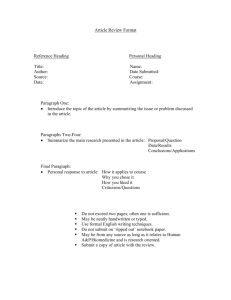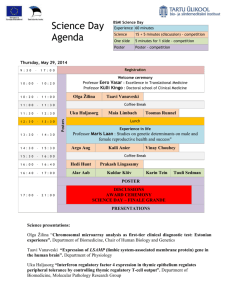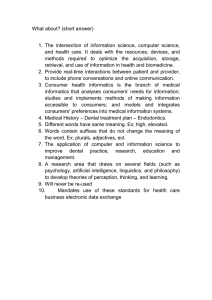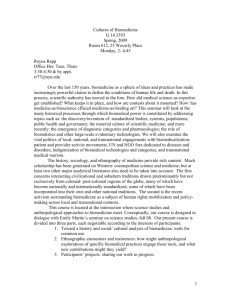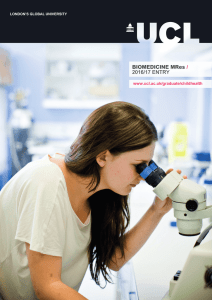Bachelor`s Programme in Biomedicine
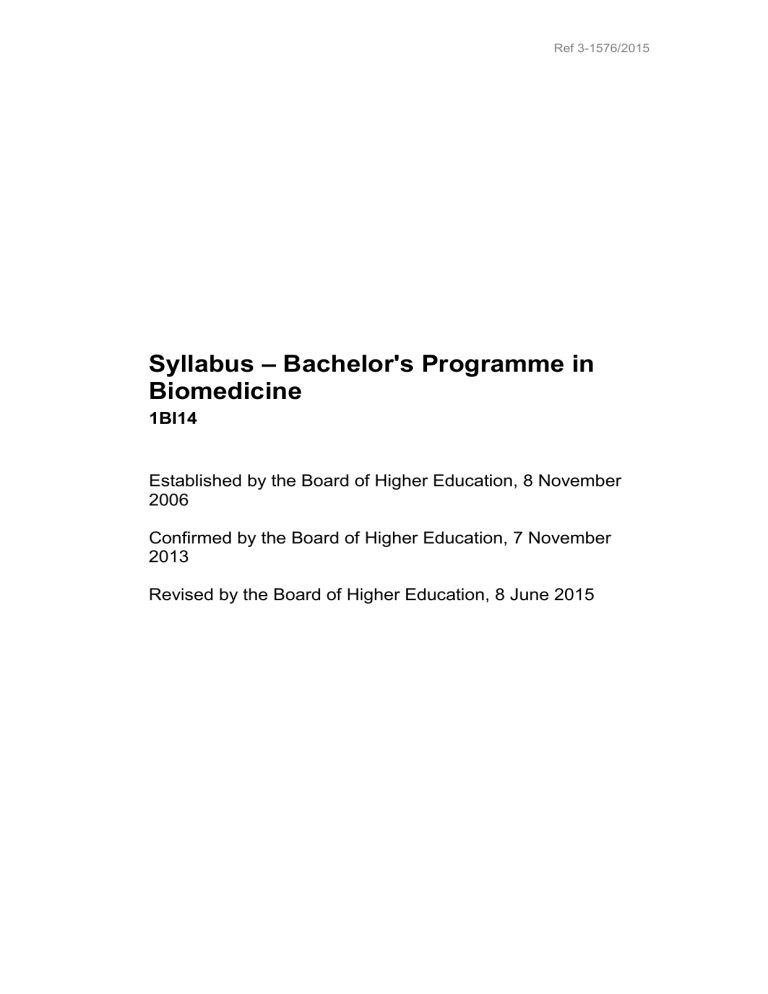
Ref 3-1576/2015
Syllabus – Bachelor's Programme in
Biomedicine
1BI14
Established by the Board of Higher Education, 8 November
2006
Confirmed by the Board of Higher Education, 7 November
2013
Revised by the Board of Higher Education, 8 June 2015
Ref 3-1576/2015
Page 2 (6)
1. Basic programme information
1.1. Programme code
1BI14
1.2. Programme title
Kandidatprogrammet i biomedicin
Bachelor’s Programme in Biomedicine.
1.3. Number of credits
180 credits (180 ECTS credits)
1.4. Starting date
The syllabus applies to students who commence their studies in or after autumn 2014.
1.5. Specific eligibility requirements
General requirements (with exemption from Swedish language proficiency).
Swedish secondary school courses: Biology 2,
Chemistry 2, Mathematics 4or the equivalent courses.
And proficiency in English equivalent to the Swedish secondary school courses: English 6/English B.
1.6. Qualification
Medicine kandidatexamen med huvudområdet biomedicin
Degree of Bachelor of Medical Science with a Major in Biomedicine
A student who fulfils the requirements for the award of a qualification shall, upon request, be provided with a certificate.
2. Outcomes
2.1. Outcomes of first cycle education according to the Higher
Education Act
First-cycle courses and study programmes shall be based fundamentally on the knowledge acquired by pupils in national study programmes in the upper-secondary schools or its equivalent.
First-cycle courses and study programmes shall develop:
– the ability of students to make independent and critical assessments
– the ability of students to identify, formulate and solve problems autonomously, and
– the preparedness of students to deal with changes in working life.
In addition to knowledge and skills in their field of study, students shall
Ref 3-1576/2015
Page 3 (6) develop the ability to:
– gather and interpret information at a scholarly level
– stay abreast of the development of knowledge, and
– communicate their knowledge to others, including those who lack specialist knowledge in the field.
2.2. Outcomes of the Degree of Bachelor according to the Higher
Education Ordinance
Knowledge and understanding
For a Degree of Bachelor of Science student shall
– demonstrate knowledge and understanding in the main field of study, including knowledge of the disciplinary foundation of the field, understanding of applicable methodologies in the field, specialised study in some aspect of the field as well as awareness of current research issues.
Competence and skills
For a Degree of Bachelor of Science student shall
– demonstrate the ability to search for, gather, evaluate and critically interpret the relevant information for a formulated problem and also discuss phenomena, issues and situations critically
– demonstrate the ability to identify, formulate and solve problems autonomously and to complete tasks within predetermined time frames
– demonstrate the ability to present and discuss information, problems and solutions in speech and writing and in dialogue with different audiences, and
– demonstrate the skills required to work autonomously in the main field of study.
Judgment and approach
For a Degree of Bachelor of Science student shall
– demonstrate the ability to make assessments in the main field of study informed by relevant disciplinary, social and ethical issues
– demonstrate insight into the role of knowledge in society and the responsibility of the individual for how it is used, and
– demonstrate the ability to identify the need for further knowledge and ongoing learning.
2.3. Outcomes of the studyprogramme at Karolinska Institutet
In addition to the national objectives, the following objectives apply for the study programme at Karolinska Institutet:
Knowledge and understanding
Following completion of the study programme, the student will
– demonstrate an extensive knowledge of natural sciences that is specifically focused on molecular and cellular processes that are relevant to human medicine,
– have knowledge of and be able to describe the biological processes and their connection to human diseases,
– demonstrate fundamental knowledge of biomedically relevant experimental methods within the study programme's subjects, including the methods' theoretical basis, execution, applications and limitations, as well as any necessary precautionary measures, and
– be able to use basic statistical methods and know other mathematical methods that are useful within biomedicine and bioinformatics.
Ref 3-1576/2015
Page 4 (6)
Skills and abilities
Following completion of the study programme, the student will
– demonstrate an ability to individually and in collaboration plan and conduct studies and experiments within the field of biomedicine, as well as to document and analyse observations,
– demonstrate knowledge of how to apply for the relevant permission and appropriations required to conduct studies within the field of biomedicine,
– demonstrate the ability to search for, analyse and summarise scientific information within the field of biomedicine and
– demonstrate an ability to describe, orally and in writing, biomedical problems/projects to both experts and the general public.
Assessment ability and attitude
Following completion of the study programme, the student will
– demonstrate insight into research ethics for and ethical aspects of
– be able to assess information and relate this to established knowledge within the field of biomedicine. research on humans and animals, as well as respect for patients' integrity, and
3. Description of the main field of study
The scientific basis for the main field of study, biomedicine, consists of explanations in the natural sciences for the functioning of the human body in health and disease. This includes processes at the molecular, cellular, organ and organism levels and interaction with chemical, physical and biological factors in the environment. The main field of study also includes the foundations and application of the methods used to acquire in-depth knowledge in the area and improve preventive methods, diagnostic methods and methods of treating diseases. Owing to its breadth, extending from fundamental physical principles to applications in clinical medicine, biomedicine is by nature interdisciplinary.
Through studies in biomedicine, students develop knowledge on
– the natural sciences basis of the principal area of study;
– pharmacological treatments and other therapies; and
– significance of individual variations for development of disease.
Knowledge in the area is applied in particular in the continued development of biomedicine through research. The knowledge acquired is additionally applied in the development and testing of new medicines and when information on these and other biomedical knowledge is presented to the public and to experts. All application has to take place on the basis of a professional approach and in accordance with accepted ethical principles in biomedicine.
4. Content and structure
The first year of the study programme contains an introduction and foundation courses in chemistry and cell and molecular biology. The second year is focused on physiology and pharmacology with biomedical applications and these courses are based on the facts and methods learned
Ref 3-1576/2015
Page 5 (6) in the first year. The third year contains molecular medicine courses and the degree project. Topics from the preceding courses are integrated with medicine and pathology in the molecular medicine courses to form a whole with a focus on translational medicine.
The teaching provides broad theoretical and practical knowledge through learning elements and laboratory work. Particularly in the later stages, the content is focused on the research front. The individual degree project constitutes the culmination of the programme and this is used to train the student in scientific method and his/her ability to analyse, summarise and present orally and in writing.
The degree project provides an opportunity for the student to create their own profile on the study programme, in which the student chooses a project from within their own choice of research subjects in academia or industry, in
Sweden or abroad.
Biomedicine is an international subject. In order to prepare for this, there are good opportunities to study parts of the programme at international partner universities.
4.1. Teaching language
The teaching language is English.
.
5. Transitional provisions
For students admitted to the programme before the fall semester 2016, the specific eligibility requirements also included Physics 2 or the equivalent.
6. Other guidelines
6.1. Grading scale
The grades used are Fail, Pass or Pass with Distinction. Alternative grading scales may apply to elective courses or cross-programme courses. The grading scale is detailed in the course syllabus.
6.2. Specific eligibility requirements within the programme
There are specific eligibility requirements for the courses within the programme. The eligibility requirements can be found in the syllabi. In cases where the requirements are connected to the admission to a later term, they are described on the programme website. There may also be specific eligibility requirements within a specific term if a course requires certain prior knowledge.
The requirements for elective courses may also be different from the requirements for the specific term of the programme.
Ref 3-1576/2015
Page 6 (6)
7. Study plan with constituent courses
4
4
4
4
5
1
2
3
1
2
3
Term
5
Name of the course
Introduktion till biomedicin /
Introduction to Biomedical Science
Allmän och organisk kemi /
General and Organic Chemistry
Medicinsk biokemi /
Medical Biochemistry
Cellbiologi och genetik /
Cell Biology and Genetics
Infektion och immunitet /
Infection and Immunity
Integrativ fysiologi /
Integrative Physiology
Neurovetenskap /
Neuroscience
Vävnadsbiologi /
Tissue Biology
Farmakologi och toxikologi /
Pharmacology and Toxicology
Biostatistik /
Biostatistics
Molekylär onkologi och tillämpad biostatistik / Molecular Oncology and applied Biostatistics
Molekylär medicin /
Molecular Medicine
Higher education credits
8
10
5
10
5
20
12
20
15
15
15
15
Alternative 1:
6 Examensarbete i biomedicin /
Degree Project in Biomedicine
Alternative 2:
6
6
Examensarbete i biomedicin /
Degree Project in Biomedicine
Valbar(a) kurs(er)
Elective Course(s)
30
22,5
7,5
First
First
First
First/
Second
Level Depth of the
First cours e
G1
First
First
First
G2
G2
G2
First
First
First
First
G2
G2
G2
G2
First
First
First
G2
G2
G2
G2
G2
G2
